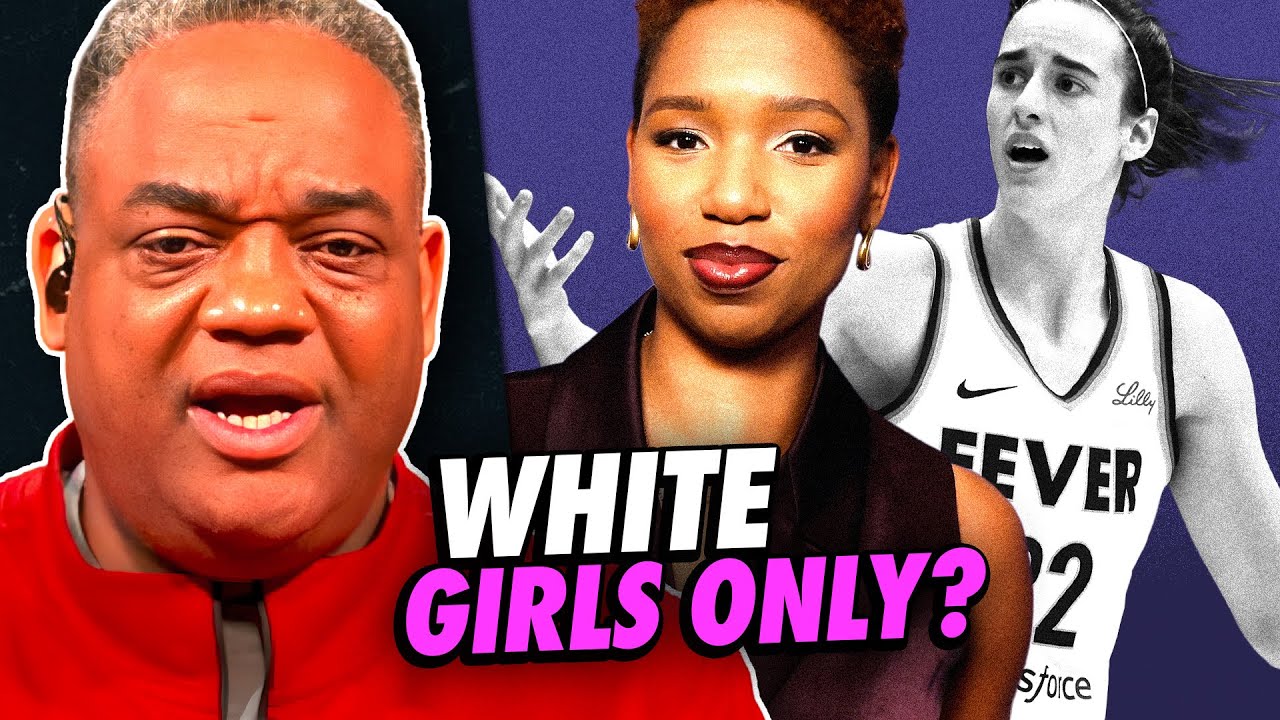Monica McNutt of ESPN Stirs Up Controversy With Her Remark About Caitlin Clark
Monica McNutt, a former basketball player and now an analyst for ESPN, is no stranger to the spotlight, but recently, her remarks about Iowa’s star player Caitlin Clark have drawn considerable attention and sparked controversy. McNutt’s comments, which were made during a live broadcast, quickly went viral, with many fans, analysts, and players weighing in. In this analysis, we’ll unpack the context of the statement, the fallout that ensued, and the broader implications for sports commentary, the culture around women’s sports, and the role of race in public discourse.
The Controversial Remark
The remark that McNutt made regarding Caitlin Clark came during a segment on ESPN’s “Around the Rim” show, where she was discussing Clark’s meteoric rise in women’s basketball and her increasing profile in the sports media. Clark, known for her electric scoring ability and leadership on the court, had become the face of women’s college basketball during the NCAA season, drawing comparisons to some of the game’s greats. However, McNutt’s comment on the show was not about Clark’s impressive performances, but rather her persona and the way she played the game.
McNutt remarked, “Caitlin Clark plays with a lot of swag, but sometimes it feels like it’s a little too much. She’s showing off too much for someone who hasn’t won anything yet.”
The comment, though not necessarily meant to be malicious, struck a nerve. It seemed to dismiss Clark’s achievements to date while also implying that her confidence and flair were unearned or excessive. Caitlin Clark, for context, had been dominating college basketball, earning multiple Player of the Year honors, leading Iowa to a deep run in the NCAA Tournament, and becoming one of the most marketable players in the sport. To many fans, McNutt’s words came off as a veiled criticism of Clark’s confidence, with some viewing it as an attack on a player who was, at the time, arguably one of the most accomplished and celebrated athletes in the college basketball landscape.
Public Reaction and Fallout
As is often the case with high-profile remarks, the public reaction was swift and polarized. Social media exploded with heated debates over McNutt’s comment. Many fans and analysts defended Caitlin Clark, arguing that McNutt had unfairly targeted a young player who was, in their view, simply expressing the confidence and enthusiasm that came with her success.
One of the loudest criticisms came from fans of women’s basketball, who felt that McNutt’s comment was emblematic of the way female athletes are often held to different standards than their male counterparts. Women in sports have long been scrutinized for showing emotion, confidence, or swagger. In contrast, male athletes often receive praise for the same traits. Critics argued that Clark, like many athletes before her, was being unfairly criticized simply for expressing herself the way male athletes like LeBron James or Stephen Curry often do without facing similar backlash.
On the other hand, some agreed with McNutt’s assessment, arguing that Clark’s public persona did indeed sometimes come off as a little too much. These critics pointed out that Clark had yet to secure a national championship or significant team success, suggesting that while her individual accomplishments were undeniable, her swagger might come across as premature. This group, though smaller, argued that McNutt’s comment was not necessarily an attack on Clark but rather a pushback against what they saw as excessive hype surrounding a player who, in their view, still had something to prove.
The Role of Race in the Controversy
An undercurrent in the controversy that emerged was the role of race, particularly given McNutt’s background as an African American analyst and Clark’s identity as a white athlete. In the context of race and women’s sports, confidence and cockiness are often perceived differently depending on the racial identity of the athlete. Black athletes, particularly women, are frequently critiqued for being too brash, too vocal, or too confident, whereas white athletes tend to be praised for similar behaviors.
This dynamic was brought to the forefront when many people, particularly Black sports commentators and fans, began pointing out that McNutt’s critique of Clark seemed to be colored by the racialized lens through which Black athletes, especially women, are often viewed. Some saw McNutt’s comments as perpetuating the narrative that Black women in sports, such as herself, are more “authentic” in their confidence and “swag,” while white athletes like Clark need to “earn” the right to display similar levels of confidence.
McNutt’s comment, whether intended that way or not, seemed to play into this racial divide, raising questions about how confidence and swagger are perceived when they come from athletes of different racial backgrounds. This conversation highlighted the broader issues of race in sports media, where Black athletes are often allowed to express themselves more freely, while white athletes, particularly women, face different expectations regarding humility and demeanor.
The Intersection of Gender and Sports Media
Another key aspect of the controversy was the gender dynamics at play. Women in sports media, particularly those who are former athletes like McNutt, often face scrutiny for their opinions, especially when those opinions involve criticism of other women. McNutt’s role as a female commentator gave her credibility in many people’s eyes, but also subjected her to heightened scrutiny because she was commenting on another woman’s performance, something that is often met with criticism when a woman in the media critiques another woman in sports.
The backlash also brought attention to the ongoing challenges that women face in sports media. In a male-dominated industry, female analysts are often expected to toe the line between professionalism and being perceived as overly critical or harsh, particularly when discussing the performances of their peers. McNutt, as a former player herself, might have been expected to offer more support to Clark, given their shared experience in the world of women’s basketball. Instead, McNutt’s critique raised questions about whether female analysts are able to navigate this delicate balance in a way that their male counterparts are not.
Moreover, McNutt’s comment underscored the larger issue of the gendered expectations placed on women athletes, especially in basketball. In men’s basketball, players like Steph Curry and Kyrie Irving are praised for their flair and confidence, with their performances only adding to their legitimacy. However, for women, particularly in sports like women’s college basketball, there’s a tendency to question the legitimacy of their style or swagger, often demanding that they “prove” themselves in ways that their male counterparts are rarely asked to.
McNutt’s Apology and Reflection
As the controversy continued to simmer, McNutt addressed the backlash. In a statement on social media, she expressed regret for how her words were interpreted, clarifying that she did not intend to diminish Caitlin Clark’s accomplishments or belittle her confidence. McNutt explained that her comments were meant to be a part of a larger discussion about how athletes, particularly women, are often expected to juggle their athletic prowess with certain expectations of humility.
While McNutt’s apology helped to calm some of the criticism, it did not fully erase the tension created by her remark. Her statement about Clark, though not malicious, had revealed deeper issues surrounding the way women’s sports are discussed, the way female athletes are expected to perform both on and off the court, and the way race factors into these conversations.
The Long-Term Impact
The Monica McNutt controversy surrounding Caitlin Clark is a microcosm of larger issues in sports media and society at large. It is indicative of the challenges women athletes face in trying to assert themselves confidently while navigating societal expectations about humility and decorum. It also highlights how race plays a complex role in shaping public perception and discourse around athletes, particularly women, and how their performances and personalities are framed.
For McNutt, this incident may serve as an important moment of reflection and growth in her career as an analyst. The conversation around her comments is a reminder of the tightrope that female sports commentators often have to walk when discussing the performances of other women athletes. It also offers a broader lesson about the need for more nuanced discussions about race, gender, and the performance expectations placed on athletes, especially in the realm of women’s sports.
As for Caitlin Clark, the controversy may only serve to further elevate her profile, particularly as she continues to prove herself on the court. If anything, the discourse around McNutt’s remarks speaks to the power and influence Clark wields as a rising star in women’s basketball. In the end, this incident is yet another chapter in the ongoing evolution of women’s sports media, where the voices of female analysts, athletes, and fans are becoming louder and more influential in shaping the narrative surrounding the game.
As sports commentary continues to evolve, it will be important to ensure that the voices of women in the industry are heard without undue criticism, and that athletes like Caitlin Clark, who exude confidence and passion for their sport, are celebrated for their contributions to the game. The McNutt-Clark controversy, while controversial, ultimately sheds light on the complexities of how we view athletes and sports personalities in the modern era, especially in the context of race, gender, and expectations of humility and success.



